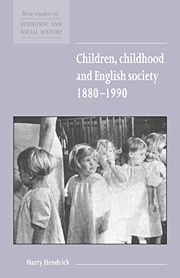Book contents
- Frontmatter
- Contents
- Acknowledgements
- 1 Introduction
- 2 New ideas of childhood: the 1880s to the 1920s
- 3 Parent–child relationships
- 4 Children and social policies
- 5 Children, schooling and the classroom
- 6 Children's leisure
- 7 Conclusion: disappearing childhood and children's rights
- Bibliography
- Index
- Titles available in the New Studies in Economic and Social History series
- Titles available in the Studies in Economic and Social History series
- Economic History Society
5 - Children, schooling and the classroom
Published online by Cambridge University Press: 05 June 2012
- Frontmatter
- Contents
- Acknowledgements
- 1 Introduction
- 2 New ideas of childhood: the 1880s to the 1920s
- 3 Parent–child relationships
- 4 Children and social policies
- 5 Children, schooling and the classroom
- 6 Children's leisure
- 7 Conclusion: disappearing childhood and children's rights
- Bibliography
- Index
- Titles available in the New Studies in Economic and Social History series
- Titles available in the Studies in Economic and Social History series
- Economic History Society
Summary
Schooling has always involved much more than the accumulation of academic knowledge. It has been central to the processes by which childhood has been socially constructed and, therefore, its history has much to tell us about the nature of the relationship between children and society. The account given here will say something about ‘how school must have seemed to the working-class boy or girl at the time’ [2: 249]; but the main purpose of this chapter is to indicate a few of the ways in which society was attempting to affect children for any one of a number of reasons – disciplinary, political, professional, educational.
From wage to school labour
We have to remember that the majority of children were in receipt of a certain amount of schooling prior to the new legislation in the 1870s, but often for no more than a few years. After the 1870 Education Act, however, schooling gradually became an accepted stage in the whole process of growing up [2: 238]. During the period 1870–1914, the school leaving age was raised three times: to ten in 1870, to eleven in 1893, and to twelve in 1899 (in many rural areas the new minimum age was ignored). In 1900 local authorities were given powers to raise the age to fourteen, but they had little effect until after the passing of the 1918 Education Act. Enforcing this legislation among the poor, many of whose children were desperately needed as wage earners, was a major struggle for the authorities who sought to compel attendance by employing school attendance officers.
- Type
- Chapter
- Information
- Children, Childhood and English Society, 1880–1990 , pp. 63 - 78Publisher: Cambridge University PressPrint publication year: 1997

